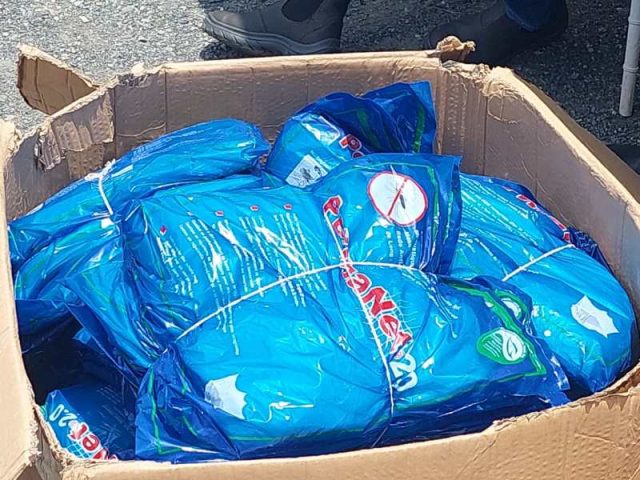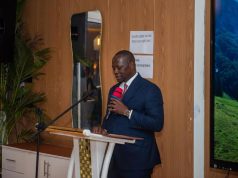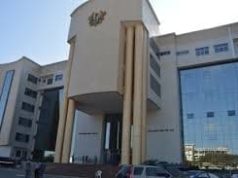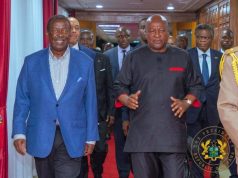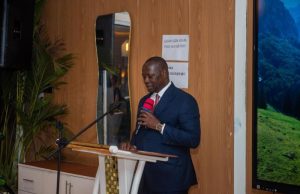By Nicholas Osei-Wusu
The AngloGold Malaria Control Programme (AGAMaL), with funding support from the Global Fund, is investing $21 million over three years to implement various interventions to complement the National Malaria Elimination Programme.
About 1.3 million people, especially children under five years, across 16 administrative districts in three regions of Ghana are benefiting from the interventions.
Key among them is the Indoor Residual Spraying (IRS) exercise, which involves the periodic disinfection of rooms and public places believed to be breeding spaces for the infected female Anopheles mosquitoes, using WHO-recommended chemicals.
The Head of Monitoring and Evaluation at AGAMaL, Ignatius Williams, disclosed this to correspondent Nicholas Osei-Wusu on the sidelines of a mini clinic at Obuasi in the Ashanti Region.
The mini clinic, organized at Black Park in the Obuasi East Municipality, was to commemorate this year’s World Malaria Day under the theme: “Malaria Ends with Us, Re-Invest, Re-Imagine, Re-Ignite.”
It was jointly organized by AngloGold Ashanti, the Health Services Directorates of the Obuasi and Obuasi East Municipalities, the Otumfuo Osei Tutu II Foundation, and others, to bring quality primary healthcare closer to the people, particularly the aged, children, and the economically vulnerable.
Although a wide range of free health services was available, the emphasis was on the diagnosis, treatment, and prevention of malaria. Patrons were therefore taken through education, testing, medication, as well as the distribution of free treated insecticide nets and organic mosquito repellents as preventive interventions.
Mr. Williams revealed that AGAMaL, a subsidiary of AngloGold Ashanti, is investing $21 million, with funding support from the Global Fund, to implement different malaria control interventions in the Ashanti, Upper West, and Savannah Regions, where about 1.3 million people are already benefiting.
“So the National Malaria Elimination Programme, then the National Malaria Control Programme, was to target the impactful tools to the highest burden areas. Upper West had the highest burden of malaria. As of the time of the stratification, the burden was above 45%, so that’s where IRS was sent,” he explained.

Mr. Williams said the three-year intervention, which will end next year, has already led to a reduction of malaria burden to about one percent prevalence in the Obuasi and Obuasi East Municipalities.
According to him, the interventions are science-based and aligned with national malaria elimination strategies, with a very promising prospect of helping achieve the national target of eliminating the disease from the country by 2030.
The Obuasi East Municipal Health Director, Ms. Charity Afrifaa-Adjei, said the two Obuasi municipalities have the lowest malaria disease burden in the Ashanti Region, mainly due to the routine IRS interventions by AGAMaL, which complement the initiatives of the National Malaria Elimination Programme. She added that there were no recorded malaria-induced deaths in the two areas last year.

Ms. Afrifaa-Adjei advised the public to take the various interventions seriously to protect themselves and their babies from mosquito bites since malaria is deadly.
According to her, “Malaria is a very serious condition. It affects everyone and has very devastating complications such as anemia, acute kidney failure, cerebral malaria, and others. In pregnant women and children, it is even more complicated, leading to premature deliveries, spontaneous abortions, anemia, convulsions, and sometimes death.”
The Community Relations Manager of AngloGold Ashanti, Edmund Oduro Agyei, explained that bringing healthcare to the doorsteps of the people is an investment in creating a healthy and resilient community.

“Among our priorities is to promote a healthy people. As it is said, a healthy being is a wealthy being. That’s why we have programmed ourselves to partner with others like the Ghana Health Service, AGA Health Foundation, and Otumfuo Foundation to periodically bring healthcare to the doorstep of the people, particularly the aged, so they can undergo medical checkups. The interesting aspect is that the services, including medication, are free so that the people of Obuasi can be healthy,” Mr. Agyei said.

